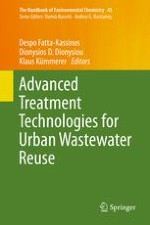2016 | OriginalPaper | Chapter
Treatment Technologies for Wastewater Reuse: Fate of Contaminants of Emerging Concern
Authors : O. González, B. Bayarri, J. Aceña, S. Pérez, D. Barceló
Published in: Advanced Treatment Technologies for Urban Wastewater Reuse
Publisher: Springer International Publishing
Activate our intelligent search to find suitable subject content or patents.
Select sections of text to find matching patents with Artificial Intelligence. powered by
Select sections of text to find additional relevant content using AI-assisted search. powered by
